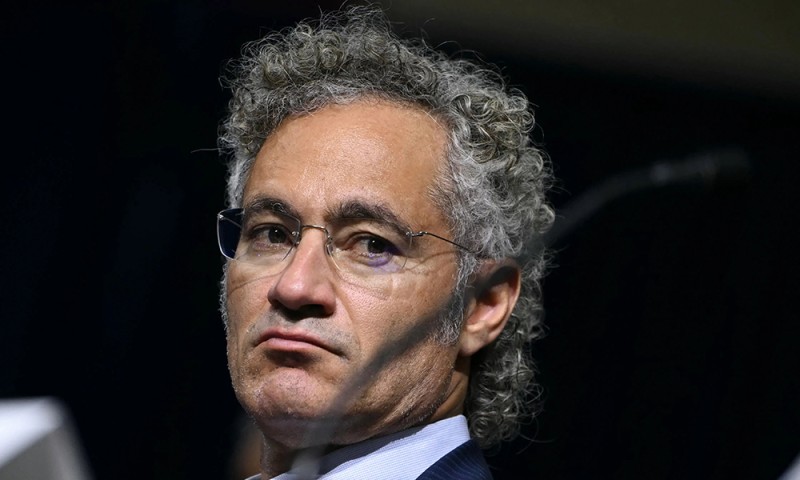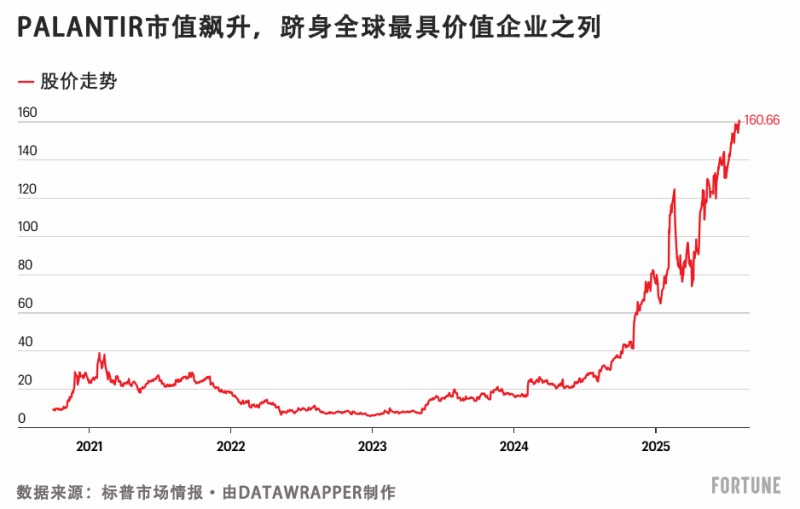
亚历克斯·卡普,这位满头卷发的防务软件公司Palantir首席执行官,在应对批评方面早已驾轻就熟。今年4月,在华盛顿特区举办的以科技政策为主题的“山谷论坛”接受采访时,一名抗议者从楼座朝他大声叫嚷,卡普却相当冷静地回应,告诉观众他认为对方有权表达自身观点。
然而本周——在Palantir于周一公布格外亮眼的财报后——卡普难得停下来,享受公司迅猛的发展势头,并对批评者予以回击。
总部位于丹佛的Palantir本周首次实现季度营收突破10亿美元,其增长数据远超分析师预期。Palantir股价飙升至每股超160美元,较去年同期增长555%。截至周二收盘,Palantir市值已逼近4090亿美元,成为全球第23大最具价值公司,紧随强生公司(Johnson & Johnson)之后,后者的营收是Palantir的23倍有余,员工数量是其35倍有余。
在周一的财报电话会议上,这位拥有新古典主义社会理论博士学位的卡普开口时,难掩喜悦之情——一如既往地夹杂着几分嘲讽意味。
“嗯,一如往常,有人提醒我对这些惊人的数据保持谦逊,但说实话,面对这样亮眼的业绩,除了感到无比自豪和感激,任何故作谦虚都显得虚伪。”卡普说道。电话会议临近尾声时,他还针对那些“每个季度都预测失误”的分析师,俏皮地对散户投资者说道:“或许别再跟那些唱衰者交流了——他们正难受着呢。”
正如卡普所言,由彼得·蒂尔(Peter Thiel)联合创立的软件公司Palantir,确实有不少“唱衰者”。作为一家在反恐战争时期起家、向美国军方出售产品的科技企业,Palantir始终深陷现代地缘政治中部分最具争议性的政治争论漩涡。尤其是在当前,因旗下软件被美国移民和海关执法局(Immigration and Customs Enforcement)以及以色列军方使用,Palantir招致诸多批评。
在财务层面,还有另一种批评声音:有人质疑,这样一家规模相对较小的公司——其营收和利润与同行相比微不足道,甚至都未能达到跻身《财富》美国500强的标准——如何能理所当然地成为全球最具价值的企业之一。
对Palantir而言,其发展之路虽缓慢却充满波折,最终才抵达如今的高度——期间经历了激烈的法律纠纷、喧闹的抗议和罢工,领导团队和员工也性格古怪,他们有时会亲切地互称“霍比特人”,以致敬公司以《指环王》命名的内部文化。(Palantir一词源自精灵创造的、能让人远距离观察或与他人交流的“真知晶球”)。而且,在最近的两年里,Palantir还搭上了生成式人工智能的“快车”。
“他们已经站稳脚跟——销售周期略有缩短。对大型跨国企业而言,其产品粘性变得极强。”风险投资家埃文·卢米斯(Evan Loomis)说道。他是Palantir联合创始人乔·朗斯代尔(Joe Lonsdale)的挚友,其旗下的建筑科技初创公司ICON使用的正是Palantir的Foundry软件平台。
尽管该公司目前是标普500指数中表现最佳的股票之一,但Palantir的股价向来以剧烈波动著称,有时还会受到散户投资者交易操作的显著影响。Palantir无疑正处于高光时刻——但这种势头能否长久延续呢?

“股价贵两倍”
分析师关注一系列短期数据点:销售额、现金流、利润、客户留存率。如果从这些短期基本面指标来看,Palantir的股价处于溢价水平。
“按照传统指标衡量,其股价至少贵两倍。”美国银行证券(Bank of America Securities)股票分析师玛丽安娜·佩雷斯·莫拉(Mariana Pérez Mora)表示,她从2022年起便开始追踪这家公司。
不过,就在我们交谈之时,佩雷斯·莫拉提醒我,对于软件即服务(SaaS)公司而言,还有另一个关键的长期衡量指标,卡普曾多次提醒旁观者要对此密切留意。该指标被称为“40法则”。
“40法则”数值通过将同比营收增长率与调整后营业利润率相加得出。若两者之和超过40%,则表明公司具备可持续增长能力。
佩雷斯·莫拉指出,若观察Palantir上个季度的业绩,“40法则”数值为94%。
“这便是它们呈现出的增长态势。实际情况是,其增长在持续加速,而且这种加速并未损害盈利能力,这一点相当与众不同,”她补充道,“Palantir股价反映了其未来发展潜力,这也是其股价处于高位的原因。”
这些数字背后潜藏着几个关键驱动因素。首先是新政府合同。
Palantir自创立伊始便与政府部门展开合作——其首个客户是中央情报局(CIA)——政府合同在其业务中仍占据主导地位。7月底,Palantir与美国陆军(U.S. Army)签署了一份为期10年、价值高达100亿美元的合同。这是美国国防部(Department of Defense)有史以来签署的最大软件合同,也是Palantir迄今为止获得的最大合同。颇具讽刺意味的是,大约10年前,Palantir曾起诉过这位客户(且胜诉),指控国防部非法将Palantir等公司排除在采购流程之外。
类似规模的合同可能还有不少。目前正在审议的《促进国防改革与政府效率法案》(FoRGED Act)将重塑美国国防部私人合同采购流程,废除数百项法规,使Palantir等科技公司更易于向政府出售产品。Palantir公开支持这项法案,其高管也在公开听证会上大力推动。该法案很可能削弱波音(Boeing)、洛克希德·马丁公司(Lockheed Martin)、RTX和诺思罗普·格鲁曼公司(Northrop Grumman)等行业老牌企业多年来积累的优势。
自特朗普任命皮特·赫格塞思(Pete Hegseth)担任美国国防部要职以来,该部门一直在削减预算。然而,Palantir似乎也从中受益。就在美国国防部宣布将与埃森哲(Accenture)和德勤(Deloitte)等咨询机构签订的合同金额削减超51亿美元后仅两个月,这两家公司便宣布与Palantir建立新战略合作伙伴关系,共同为政府客户提供解决方案。
然而,Palantir过去一年的主要增长动力源自其业务中较新的客户群体——商业领域客户。上一季度,商业领域营收同比增长93%。而几乎所有这些合同都源于其2023年推出的生成式人工智能平台“AIP”(即“人工智能平台”)。
佩雷斯·莫拉表示,虽然很多公司都在构建和提供大型语言模型,但Palantir已找到助力企业利用这些模型,并为其业务带来实际成效的途径。
在最近一次财报电话会议上,卡普表示,花旗银行(Citibank)能在数秒内完成客户开户流程以及相关的了解客户和安全审核工作,而此前这一过程需耗时九天。他指出,住房抵押贷款机构房利美(Fannie Mae)如今能在数秒内发现抵押贷款欺诈行为,而此前这一过程需耗时两个月。此外,他还提到,李尔公司(Lear Corporation)正使用Palantir平台来管理关税风险敞口。
投资者似乎已然留意到这一情况,自2023年AIP平台推出后,Palantir股价便呈现稳步上升态势,二者之间存在直接关联。
然而,生成式人工智能尚属新兴领域,众多企业和行业尚未充分探索或意识到人工智能能够取代哪些工作,或是能让哪些工作实现效率提升。就连Palantir自身,似乎也尚未将这一问题完全梳理清楚。
首席执行官卡普本周在接受美国消费者新闻与商业频道(CNBC)采访时表示,他认为Palantir公司在裁员500人、将员工规模缩减至约3600人的情况下仍能维持营收增长。但若观察Palantir的员工数量,实际情况恰恰相反:2023至2024年间,该公司员工增加了约200名,而非裁员。尽管像Alphabet或赛富时(Salesforce)这样的公司都宣称通过使用人工智能提升了内部效率,但这些公司的员工数量仍在增加。
硅谷最具争议的公司之一
尽管Palantir的估值或许正一路飙升至新高度,但该公司依然备受争议。在纽约、帕洛阿托、丹佛、西雅图和洛杉矶等地,数百人举行静坐、抗议游行等活动,谴责Palantir与美国移民和海关执法局签订的合同(Palantir称,该合同是为期六个月的试点项目,“聚焦于执法优先级和移民生命周期管理”)。Palantir与以色列国防军(IDF)围绕“战争相关任务”建立的合作关系也遭到抨击。6月提交给联合国人权理事会的一份报告点名批评了在加沙战争中为以色列提供支持的企业(包括洛克希德·马丁公司),其中提到“有合理理由相信”Palantir正向以色列提供自动预测性警务技术和核心国防基础设施。
Palantir的一位女发言人表示,该公司“并未向以色列提供用于在加沙地区发动导弹袭击或进行目标定位的技术,也未参与‘薰衣草’(Lavendar)或‘福音’(Gospel)系统。这些目标定位能力完全独立于我们与以色列国防部的合作项目,且早在双方开展合作之前就已存在。”

在最近一次财报电话会议中,卡普就Palantir多年来承受的诸多批评作出了回应。他表示:“Palantir之所以遭到抨击,不过是因为我们助力国家迈向更美好的未来,支持这些价值观,并捍卫它。”今年早些时候,卡普与Palantir企业事务主管尼古拉斯·扎米斯卡(Nicholas Zamiska),共同出版《科技共和国》(The Technological Republic)一书。书中批评硅谷将时间浪费在消费类应用上,回避与政府合作,未能在捍卫自由与民主方面发挥作用。
然而,过去几年间,甚至有部分前员工公开对Palantir提出反对意见。今年5月,数十名前Palantir员工向科技界发表公开信,称Palantir因与特朗普政府合作而违背了公司核心原则。
“Palantir以在与工作相关棘手问题上存在激烈内部讨论甚至分歧为荣,”Palantir的一位女发言人表示,“诚然,提出担忧的少数前员工——4000人中仅有13人——有权表达他们的观点。”
尽管在公共场合面临愈发严苛的批评,但自2022年俄乌冲突爆发以来,硅谷不仅接受了国防科技,甚至开始积极投身这一领域。如今,国防科技已然成为最炙手可热的领域之一,例如无人机初创公司安杜里尔工业公司(Anduril)在私募市场的估值高达305亿美元。
事实上,科技公司过去向来对国防合同避之不及。然而,在特朗普政府执政期间,这一局面发生了根本性转变。Meta与安杜里尔工业公司达成合作,启动为美国军方研发头盔和头戴式设备的项目。包括OpenAI、xAI和Anthropic在内的多家大型语言模型公司,也开始与美国国防部在国家安全领域展开合作。就连谷歌(Google)——2018年因员工强烈反对而终止与政府合作的事迹广为人知——也重新涉足军事业务。
从某种意义上来说,Palantir和太空探索技术公司(SpaceX)堪称推动这一转变的催化剂。众所周知,Palantir创始人最初寻求融资时,曾遭到硅谷顶级风投公司拒绝,红杉资本(Sequoia Capital)和凯鹏华盈(Kleiner Perkins)都放弃了投资机会。最终,联合创始人蒂尔不仅投入了大量个人资金,还从乔治·沃克·布什(George W. Bush)政府前官员以及中情局旗下风投公司In-Q-Tel处成功筹集到资金。
如今,随着蒂尔的门生詹姆斯·戴维·万斯(J.D. Vance)出任美国副总统,再加上美国政府对国防科技持友好态度,Palantir得以跻身最高权力核心圈。卡普每个季度都会在公司官网以英、德、法三种语言发布一封“致股东信”,与财务业绩一同公布,信中分享了他的诸多想法。“美国并非、也不应被允许沦为全球价值观与品味的软弱妥协产物和混杂集合体。”卡普在最新一期信函中写道,还引用了克莱夫·斯特普尔斯·刘易斯(C.S. Lewis)1943年著作中描述的“没有胸膛的人”(注:此概念指能进行逻辑推演,却无法对价值形成本能认同,最终沦为理性与情感割裂的空洞存在)。
卡普表示:“这些‘没有胸膛的人’承诺引领我们前行,可实则空洞无物,甚至连一星半点振奋人心的世界观或信念体系都拿不出来,满心满眼只有自我保全与向上攀爬。” 至少就当下情况来看,卡普的世界观以及Palantir的业务拓展态势,似乎正在挑战那些批评者、唱衰者以及所谓“没有胸膛的人”。(*)
译者:中慧言-王芳
亚历克斯·卡普,这位满头卷发的防务软件公司Palantir首席执行官,在应对批评方面早已驾轻就熟。今年4月,在华盛顿特区举办的以科技政策为主题的“山谷论坛”接受采访时,一名抗议者从楼座朝他大声叫嚷,卡普却相当冷静地回应,告诉观众他认为对方有权表达自身观点。
然而本周——在Palantir于周一公布格外亮眼的财报后——卡普难得停下来,享受公司迅猛的发展势头,并对批评者予以回击。
总部位于丹佛的Palantir本周首次实现季度营收突破10亿美元,其增长数据远超分析师预期。Palantir股价飙升至每股超160美元,较去年同期增长555%。截至周二收盘,Palantir市值已逼近4090亿美元,成为全球第23大最具价值公司,紧随强生公司(Johnson & Johnson)之后,后者的营收是Palantir的23倍有余,员工数量是其35倍有余。
在周一的财报电话会议上,这位拥有新古典主义社会理论博士学位的卡普开口时,难掩喜悦之情——一如既往地夹杂着几分嘲讽意味。
“嗯,一如往常,有人提醒我对这些惊人的数据保持谦逊,但说实话,面对这样亮眼的业绩,除了感到无比自豪和感激,任何故作谦虚都显得虚伪。”卡普说道。电话会议临近尾声时,他还针对那些“每个季度都预测失误”的分析师,俏皮地对散户投资者说道:“或许别再跟那些唱衰者交流了——他们正难受着呢。”
正如卡普所言,由彼得·蒂尔(Peter Thiel)联合创立的软件公司Palantir,确实有不少“唱衰者”。作为一家在反恐战争时期起家、向美国军方出售产品的科技企业,Palantir始终深陷现代地缘政治中部分最具争议性的政治争论漩涡。尤其是在当前,因旗下软件被美国移民和海关执法局(Immigration and Customs Enforcement)以及以色列军方使用,Palantir招致诸多批评。
在财务层面,还有另一种批评声音:有人质疑,这样一家规模相对较小的公司——其营收和利润与同行相比微不足道,甚至都未能达到跻身《财富》美国500强的标准——如何能理所当然地成为全球最具价值的企业之一。
对Palantir而言,其发展之路虽缓慢却充满波折,最终才抵达如今的高度——期间经历了激烈的法律纠纷、喧闹的抗议和罢工,领导团队和员工也性格古怪,他们有时会亲切地互称“霍比特人”,以致敬公司以《指环王》命名的内部文化。(Palantir一词源自精灵创造的、能让人远距离观察或与他人交流的“真知晶球”)。而且,在最近的两年里,Palantir还搭上了生成式人工智能的“快车”。
“他们已经站稳脚跟——销售周期略有缩短。对大型跨国企业而言,其产品粘性变得极强。”风险投资家埃文·卢米斯(Evan Loomis)说道。他是Palantir联合创始人乔·朗斯代尔(Joe Lonsdale)的挚友,其旗下的建筑科技初创公司ICON使用的正是Palantir的Foundry软件平台。
尽管该公司目前是标普500指数中表现最佳的股票之一,但Palantir的股价向来以剧烈波动著称,有时还会受到散户投资者交易操作的显著影响。Palantir无疑正处于高光时刻——但这种势头能否长久延续呢?
“股价贵两倍”
分析师关注一系列短期数据点:销售额、现金流、利润、客户留存率。如果从这些短期基本面指标来看,Palantir的股价处于溢价水平。
“按照传统指标衡量,其股价至少贵两倍。”美国银行证券(Bank of America Securities)股票分析师玛丽安娜·佩雷斯·莫拉(Mariana Pérez Mora)表示,她从2022年起便开始追踪这家公司。
不过,就在我们交谈之时,佩雷斯·莫拉提醒我,对于软件即服务(SaaS)公司而言,还有另一个关键的长期衡量指标,卡普曾多次提醒旁观者要对此密切留意。该指标被称为“40法则”。
“40法则”数值通过将同比营收增长率与调整后营业利润率相加得出。若两者之和超过40%,则表明公司具备可持续增长能力。
佩雷斯·莫拉指出,若观察Palantir上个季度的业绩,“40法则”数值为94%。
“这便是它们呈现出的增长态势。实际情况是,其增长在持续加速,而且这种加速并未损害盈利能力,这一点相当与众不同,”她补充道,“Palantir股价反映了其未来发展潜力,这也是其股价处于高位的原因。”
这些数字背后潜藏着几个关键驱动因素。首先是新政府合同。
Palantir自创立伊始便与政府部门展开合作——其首个客户是中央情报局(CIA)——政府合同在其业务中仍占据主导地位。7月底,Palantir与美国陆军(U.S. Army)签署了一份为期10年、价值高达100亿美元的合同。这是美国国防部(Department of Defense)有史以来签署的最大软件合同,也是Palantir迄今为止获得的最大合同。颇具讽刺意味的是,大约10年前,Palantir曾起诉过这位客户(且胜诉),指控国防部非法将Palantir等公司排除在采购流程之外。
类似规模的合同可能还有不少。目前正在审议的《促进国防改革与政府效率法案》(FoRGED Act)将重塑美国国防部私人合同采购流程,废除数百项法规,使Palantir等科技公司更易于向政府出售产品。Palantir公开支持这项法案,其高管也在公开听证会上大力推动。该法案很可能削弱波音(Boeing)、洛克希德·马丁公司(Lockheed Martin)、RTX和诺思罗普·格鲁曼公司(Northrop Grumman)等行业老牌企业多年来积累的优势。
自特朗普任命皮特·赫格塞思(Pete Hegseth)担任美国国防部要职以来,该部门一直在削减预算。然而,Palantir似乎也从中受益。就在美国国防部宣布将与埃森哲(Accenture)和德勤(Deloitte)等咨询机构签订的合同金额削减超51亿美元后仅两个月,这两家公司便宣布与Palantir建立新战略合作伙伴关系,共同为政府客户提供解决方案。
然而,Palantir过去一年的主要增长动力源自其业务中较新的客户群体——商业领域客户。上一季度,商业领域营收同比增长93%。而几乎所有这些合同都源于其2023年推出的生成式人工智能平台“AIP”(即“人工智能平台”)。
佩雷斯·莫拉表示,虽然很多公司都在构建和提供大型语言模型,但Palantir已找到助力企业利用这些模型,并为其业务带来实际成效的途径。
在最近一次财报电话会议上,卡普表示,花旗银行(Citibank)能在数秒内完成客户开户流程以及相关的了解客户和安全审核工作,而此前这一过程需耗时九天。他指出,住房抵押贷款机构房利美(Fannie Mae)如今能在数秒内发现抵押贷款欺诈行为,而此前这一过程需耗时两个月。此外,他还提到,李尔公司(Lear Corporation)正使用Palantir平台来管理关税风险敞口。
投资者似乎已然留意到这一情况,自2023年AIP平台推出后,Palantir股价便呈现稳步上升态势,二者之间存在直接关联。
然而,生成式人工智能尚属新兴领域,众多企业和行业尚未充分探索或意识到人工智能能够取代哪些工作,或是能让哪些工作实现效率提升。就连Palantir自身,似乎也尚未将这一问题完全梳理清楚。
首席执行官卡普本周在接受美国消费者新闻与商业频道(CNBC)采访时表示,他认为Palantir公司在裁员500人、将员工规模缩减至约3600人的情况下仍能维持营收增长。但若观察Palantir的员工数量,实际情况恰恰相反:2023至2024年间,该公司员工增加了约200名,而非裁员。尽管像Alphabet或赛富时(Salesforce)这样的公司都宣称通过使用人工智能提升了内部效率,但这些公司的员工数量仍在增加。
硅谷最具争议的公司之一
尽管Palantir的估值或许正一路飙升至新高度,但该公司依然备受争议。在纽约、帕洛阿托、丹佛、西雅图和洛杉矶等地,数百人举行静坐、抗议游行等活动,谴责Palantir与美国移民和海关执法局签订的合同(Palantir称,该合同是为期六个月的试点项目,“聚焦于执法优先级和移民生命周期管理”)。Palantir与以色列国防军(IDF)围绕“战争相关任务”建立的合作关系也遭到抨击。6月提交给联合国人权理事会的一份报告点名批评了在加沙战争中为以色列提供支持的企业(包括洛克希德·马丁公司),其中提到“有合理理由相信”Palantir正向以色列提供自动预测性警务技术和核心国防基础设施。
Palantir的一位女发言人表示,该公司“并未向以色列提供用于在加沙地区发动导弹袭击或进行目标定位的技术,也未参与‘薰衣草’(Lavendar)或‘福音’(Gospel)系统。这些目标定位能力完全独立于我们与以色列国防部的合作项目,且早在双方开展合作之前就已存在。”
在最近一次财报电话会议中,卡普就Palantir多年来承受的诸多批评作出了回应。他表示:“Palantir之所以遭到抨击,不过是因为我们助力国家迈向更美好的未来,支持这些价值观,并捍卫它。”今年早些时候,卡普与Palantir企业事务主管尼古拉斯·扎米斯卡(Nicholas Zamiska),共同出版《科技共和国》(The Technological Republic)一书。书中批评硅谷将时间浪费在消费类应用上,回避与政府合作,未能在捍卫自由与民主方面发挥作用。
然而,过去几年间,甚至有部分前员工公开对Palantir提出反对意见。今年5月,数十名前Palantir员工向科技界发表公开信,称Palantir因与特朗普政府合作而违背了公司核心原则。
“Palantir以在与工作相关棘手问题上存在激烈内部讨论甚至分歧为荣,”Palantir的一位女发言人表示,“诚然,提出担忧的少数前员工——4000人中仅有13人——有权表达他们的观点。”
尽管在公共场合面临愈发严苛的批评,但自2022年俄乌冲突爆发以来,硅谷不仅接受了国防科技,甚至开始积极投身这一领域。如今,国防科技已然成为最炙手可热的领域之一,例如无人机初创公司安杜里尔工业公司(Anduril)在私募市场的估值高达305亿美元。
事实上,科技公司过去向来对国防合同避之不及。然而,在特朗普政府执政期间,这一局面发生了根本性转变。Meta与安杜里尔工业公司达成合作,启动为美国军方研发头盔和头戴式设备的项目。包括OpenAI、xAI和Anthropic在内的多家大型语言模型公司,也开始与美国国防部在国家安全领域展开合作。就连谷歌(Google)——2018年因员工强烈反对而终止与政府合作的事迹广为人知——也重新涉足军事业务。
从某种意义上来说,Palantir和太空探索技术公司(SpaceX)堪称推动这一转变的催化剂。众所周知,Palantir创始人最初寻求融资时,曾遭到硅谷顶级风投公司拒绝,红杉资本(Sequoia Capital)和凯鹏华盈(Kleiner Perkins)都放弃了投资机会。最终,联合创始人蒂尔不仅投入了大量个人资金,还从乔治·沃克·布什(George W. Bush)政府前官员以及中情局旗下风投公司In-Q-Tel处成功筹集到资金。
如今,随着蒂尔的门生詹姆斯·戴维·万斯(J.D. Vance)出任美国副总统,再加上美国政府对国防科技持友好态度,Palantir得以跻身最高权力核心圈。卡普每个季度都会在公司官网以英、德、法三种语言发布一封“致股东信”,与财务业绩一同公布,信中分享了他的诸多想法。“美国并非、也不应被允许沦为全球价值观与品味的软弱妥协产物和混杂集合体。”卡普在最新一期信函中写道,还引用了克莱夫·斯特普尔斯·刘易斯(C.S. Lewis)1943年著作中描述的“没有胸膛的人”(注:此概念指能进行逻辑推演,却无法对价值形成本能认同,最终沦为理性与情感割裂的空洞存在)。
卡普表示:“这些‘没有胸膛的人’承诺引领我们前行,可实则空洞无物,甚至连一星半点振奋人心的世界观或信念体系都拿不出来,满心满眼只有自我保全与向上攀爬。” 至少就当下情况来看,卡普的世界观以及Palantir的业务拓展态势,似乎正在挑战那些批评者、唱衰者以及所谓“没有胸膛的人”。(*)
译者:中慧言-王芳
Alex Karp, the frizzy-haired CEO of defense software company Palantir, has become somewhat of a pro at deflecting criticism. As he sat for an interview in April at the tech policy-focused Hill and Valley Forum in Washington D.C. and a heckler started shouting at him from the balcony, Karp retorted rather calmly, telling the audience he believed it was her right to express her views.
But this week—after Palantir reported blockbuster earnings on Monday—Karp took a moment to bask in his company’s meteoric rise and take a jab at his critics.
Palantir, based in Denver, surpassed $1 billion in quarterly revenue for the first time this week, posting growth figures that blew past analyst estimates. Palantir’s stock soared to more than $160 a share, marking a 555% increase from this time last year. By market close on Tuesday, Palantir’s market cap had hit nearly $409 billion, making it the 23rd most valuable company in the world, just behind Johnson & Johnson, a company with more than 23 times Palantir’s revenue and more than 35x the number of employees.
As he started speaking on Monday’s earnings call, Karp, who has a PhD in neoclassical social theory, was absolutely delighted—and true to form, a bit snarky, too.
“Well, as usual, I’ve been cautioned to be a little modest about our bombastic numbers, but honestly, there’s no authentic way to be anything but have enormous pride and gratefulness about these extraordinary numbers,” Karp said. As he wrapped up the call, he gave a quippy message to retail investors about the analysts that have “been wrong about every quarter.” “Maybe stop talking to all the haters—they’re suffering,” he said.
Palantir, a software company co-founded by Peter Thiel, has many “haters,” as Karp puts it. As a tech company that got its start selling to the U.S. military during the War on Terror, Palantir has been fully embedded in some of the most polarizing political debates of modern geopolitics. Particularly now, Palantir has stirred criticism over its software being used by Immigration and Customs Enforcement, as well as the Israeli military.
On the financial side, there’s a different kind of critic: those who question how such a relatively small company—one whose revenue and profits are so small in comparison to peers that it doesn’t even qualify for the Fortune 500 list—could reasonably become one of the most valuable companies in the world.
For Palantir, it has been a slow, albeit volatile, climb to where it is now—marked by contentious legal battles, noisy protests and picket lines, and an eccentric leadership team and employee base who sometimes endearingly refer to one another as “hobbits,” in credit to the company’s Lord of the Rings nomenclature (Palantir is in reference to the seeing stones created by Elves that allow people to see far away or communicate with others). And, more recently, in the last two years, Palantir has ridden the generative AI wave.
“They’ve got their feet under them—they’ve got their sales cycle down a little bit more. They’re just making things really, really sticky for large multinational corporations,” says Evan Loomis, a venture capitalist who is close friends with Palantir cofounder Joe Lonsdale and whose construction technology startup, ICON, uses Palantir’s software platform Foundry.
While the company is currently one of the best-performing stocks in the S&P 500, Palantir’s stock has also been known to be incredibly volatile, and sometimes dramatically influenced by retail investor activity. Palantir is undoubtedly having a moment—but will it last?
‘Two times more expensive’
There are a host of near-term data points analysts look at: sales, cash flow, profit, customer retention. If you look at most of these near-term fundamentals, Palantir is trading at a premium.
“They are trading at least two times more expensive on the traditional metrics,” says Mariana Pérez Mora, an equity analyst at Bank of America Securities, who has been following the company since 2022.
But, as we speak, Pérez Mora reminds me about another important, longer-term metric for SaaS companies that Karp has repeatedly reminded onlookers to pay close attention to. That metric is called the “Rule of Forty.”
The Rule of Forty figure is calculated by adding the year-over-year revenue growth rate and adjusted operating margin. If those percentages are collectively higher than 40%, you have sustainable growth.
If you look at Palantir’s last quarter, Pérez Mora points out, the rule of 40 was 94%.
“That is the type of growth they are having. And the reality is that growth is accelerating, and that accelerating growth is not at the expense of profitability. And that is pretty unique,” she says, adding: “Palantir is trading as the company that they are growing into, and this is why it’s more expensive.”
There are a few key contributors to these numbers. For one, new government contracts.
Palantir has been working with the government since the beginning—its first customer being the CIA—and government contracts still make up a majority of its business. At the end of July, Palantir signed a 10-year contract worth up to $10 billion with the U.S. Army. It was one of the largest software contracts the Department of Defense has ever signed and, by far, Palantir’s largest contract to-date. And, ironically, it is the same customer Palantir sued (successfully) almost 10 years ago, accusing the department of unlawfully excluding companies like Palantir from its procurement process.
There could be more contracts of this scale on the table, too. The Fostering Reform and Government Efficiency Act, or FoRGED Act, currently on the table would reshape the Department of Defense’s procurement process for private contracts, eliminating hundreds of statutes and making it easier for tech companies like Palantir to sell to the government. The legislation, which Palantir has publicly endorsed and which its executives have pushed for in public hearings, would likely cut into the advantage that some of the industry incumbents like Boeing, Lockheed Martin, RTX, and Northrop Grumman have gained over the years.
The Department of Defense has been making trims to its budget since Trump named Pete Hegseth to the top role. But Palantir is seemingly benefitting from that, too. Only a couple months after the Department of Defense said it had cut more than $5.1 billion in contracts to consulting agencies, including Accenture and Deloitte, both companies announced new strategic partnerships with Palantir to collectively deliver solutions to government clients.
But the lion share of growth at Palantir over the last year is coming from a newer segment of customers—the commercial side of the business. Revenue for the commercial side rose 93% year-over-year this past quarter. And nearly all of those contracts stem from the generative artificial intelligence platform it released in 2023, called “AIP” (which stands for the ever-original “artificial intelligence platform”).
Perez Mora says that while a lot of companies are building and offering large language models, Palantir has found a way to help companies make use of them—and drive real results for their businesses.
On this last earnings call, Karp said that Citibank was onboarding its customers and running the relevant know-your-customer and security checks in seconds, down from nine days. He said that residential mortgage enterprise Fannie Mae is uncovering mortgage fraud in seconds, versus two months. And he said that Lear Corporation is using Palantir’s platform to manage tariff exposure.
Investors seem to have taken note, as there is a direct correlation between the launch of AIP in 2023 and the steady upward trajectory Palantir’s stock has experienced since.
But generative AI is still new—and many companies and industries haven’t fully explored or realized just what jobs AI will be able to replace or make more efficient. Palantir itself doesn’t seem to have it sorted out either.
CEO Karp said in an interview on CNBC this week that he thinks Palantir could keep growing revenue while reducing headcount by 500 jobs to about 3,600 people. But if you look at Palantir’s headcount, it has been doing the opposite: adding about 200 people between 2023 and 2024, not cutting roles. For all that companies like Alphabet or Salesforce are boasting of the efficiencies they are adding within their ranks by using AI, those same companies have seen their workforces grow.
One of Silicon Valley’s most controversial companies
Palantir’s valuation may be climbing to new heights, but the company is as controversial as ever. They’ve been the target of sit-ins, picketings, and other protests that have pulled in hundreds of people in New York City, Palo Alto, Denver, Seattle, and Los Angeles, condemning Palantir’s contract with the ICE (Palantir has been running a six-month pilot contract “centered on enforcement prioritization and immigration lifecycle management,” the company says.) Palantir has a partnership with the Israeli Defense Forces for “war-related missions,” which has also come under fire. A report submitted to the UN Human Rights Council in June that singled out companies aiding Israel in the war in Gaza, including Lockheed Martin, said there was “reasonable grounds to believe” Palantir was providing automatic predictive policing technology and core defense infrastructure to Israel.
A Palantir spokeswoman said the company “does not provide the technology for Israel to conduct missile strikes or targeting operations in Gaza and has no involvement in the Lavendar or Gospel systems. These targeting capabilities are entirely independent of and predate our partnership with Israel’s Ministry of Defense.”
Karp addressed some of the criticism Palantir has received over the years on the last earnings call. “Palantir gets attacked just because we help make this country even better, because we support the values, because we defend it,” he said. Earlier this year, Karp and Palantir’s head of corporate affairs, Nicholas Zamiska, published The Technological Republic, which criticizes Silicon Valley for spending its time on consumer apps and dodging working with the government and playing a role in defending freedoms and democracy.
But there has also been some notable pushback even from former employees in the last couple years. In May, more than a dozen former Palantir employees signed an open letter to the tech community, alleging that Palantir had violated principles core to the company due to its work with the Trump Administration.
“Palantir prides itself on [a] culture of fierce internal dialogue and even disagreement on difficult issues related to our work,” a Palantir spokeswoman said. “The small number of former Palantir employees—13 of 4,000—raising concerns are certainly entitled to express their views.”
Despite heightened criticism on the public stage, Silicon Valley has come to not only accept, but embrace defense tech since 2022, when Russia invaded Ukraine. It’s one of the hottest sectors around right now, with companies like drone startup Anduril garnering a $30.5 billion valuation in the private markets.
Indeed, tech companies used to shy away from defense contracts. But under the Trump Administration, there’s been a tidal shift. Meta teamed up with Anduril to start working on helmet and headset projects for the U.S. military. Numerous LLM companies, including OpenAI, xAI, and Anthropic, started working with the Department of Defense on national security. Even Google, which famously stopped working with the government in 2018 after internal upheaval from its employees, has gotten into the military business.
In some ways, Palantir—and SpaceX, too—have been a catalyst for the shift. Palantir had initially been rejected from top Silicon Valley venture capital firms when the founders tried to raise initial capital, as Sequoia Capital and Kleiner Perkins both famously passed on the investment. Cofounder Thiel ended up putting in much of his own money and raising capital from former officials from President George W. Bush’s administration as well as the CIA’s venture capital firm In-Q-Tel.
Now, with Thiel protegee J.D. Vance as Vice President of the United States, and a defense-tech-friendly White House in charge, the company has access to the inner circle at the highest levels of power. And Karp, who pens a “letter to shareholders” that’s published on Palantir’s site in English, German, and French each quarter alongside the financial results, has a lot of thoughts to share. “The United States is not, and should not be permitted to become, a soft compromise and amalgam of global values and tastes,” Karp wrote in his most recent letter, referencing a 1943 work by C.S. Lewis which describes “men without chests.”
“Such men without chests,” Karp says, “promise to shepherd us forward yet lack much substance and content, even a flicker of an animating worldview or belief structure, other than their own self-preservation and advancement.” For now, at least, Karp’s worldview and Palantir’s business seem to be defying the critics, the haters, and the chestless.

